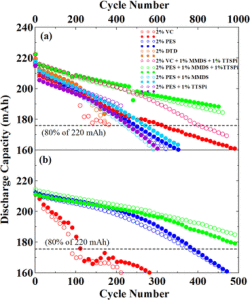 The electric car industry is on the rise, but battery performance for these vehicles is still not where it needs to be to implement wide-scale usage. To address this issue, researchers from Dalhousie University have produced a ternary blend of electrolyte additives to improve the performance of the li-ion cell.
The electric car industry is on the rise, but battery performance for these vehicles is still not where it needs to be to implement wide-scale usage. To address this issue, researchers from Dalhousie University have produced a ternary blend of electrolyte additives to improve the performance of the li-ion cell.
An open access paper recently published in the Journal of The Electrochemical Society (JES) details a novel development in electrolyte additives that, once applied to the li-ion cell, demonstrate a very high charge-discharge capacity.
The team began their study by investigating the performance of NMC pouch cells and electrolytes with various sulfur or phosphorus electrolyte additives.
They concluded that the new additive will improve the life cycle performance of the li-ion battery, as well as improve upon its safety.
The additive blend, “PES-211”, can yield significant cycle life improvements for NMC/graphite cells operating at both 4.2 V and 4.4 V and lower thermal reactivity for the charged graphite electrode. We encourage Li-ion battery manufacturers and researchers studying NMC-based Li-ion cells to try “PES211” in their experiments.
The authors of this paper include ECS Fellow Jeff Dahn, and ECS members Lin Ma and Jian Xia.
[Sources: Green Car Congress & JES]Check out more of Dahn’s research in the ECS Digital Library!
And make sure to attend the ECS Conference on Electrochemical Energy Conversion & Storage with SOFC-XIV, where Dahn is an invited speaker.

